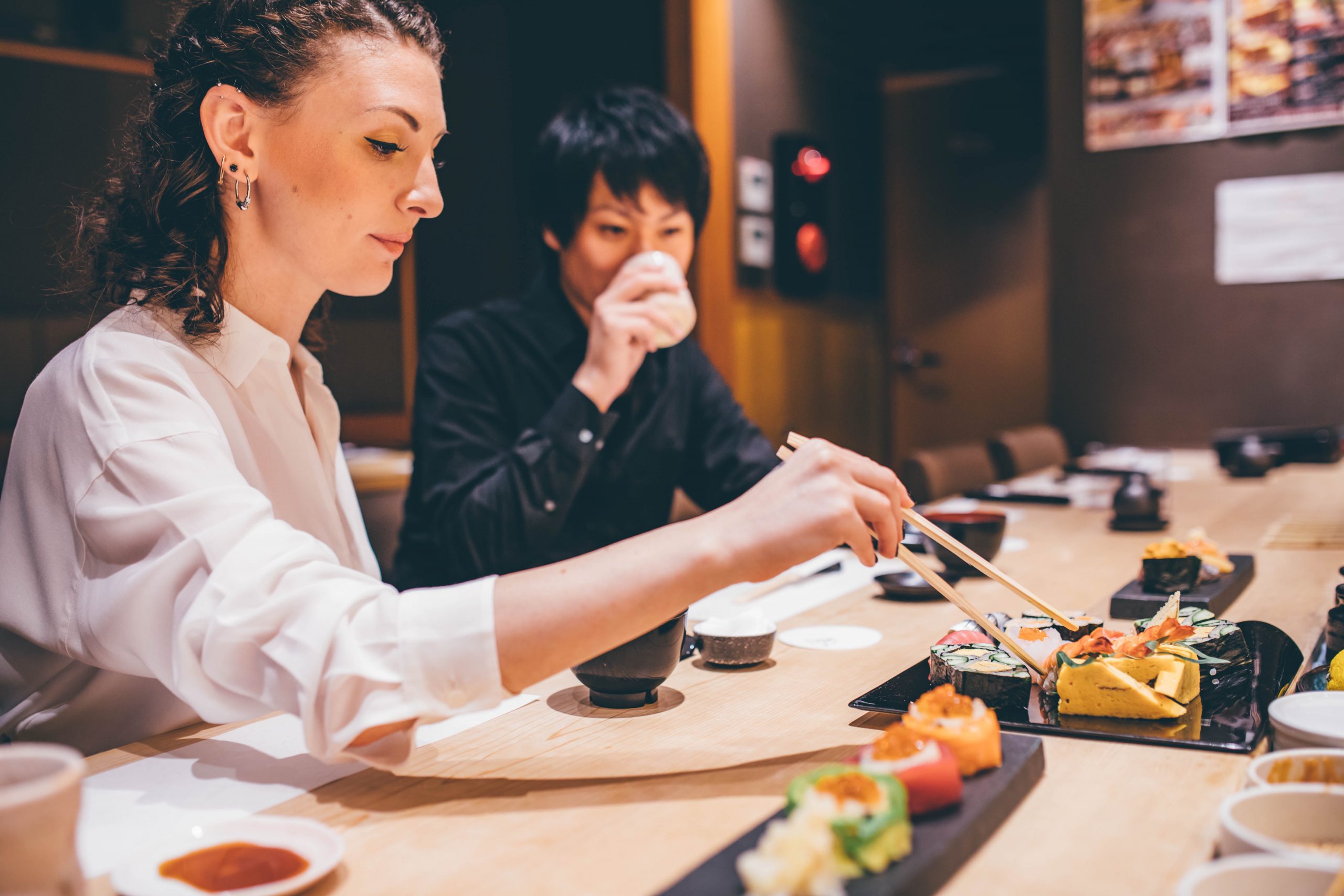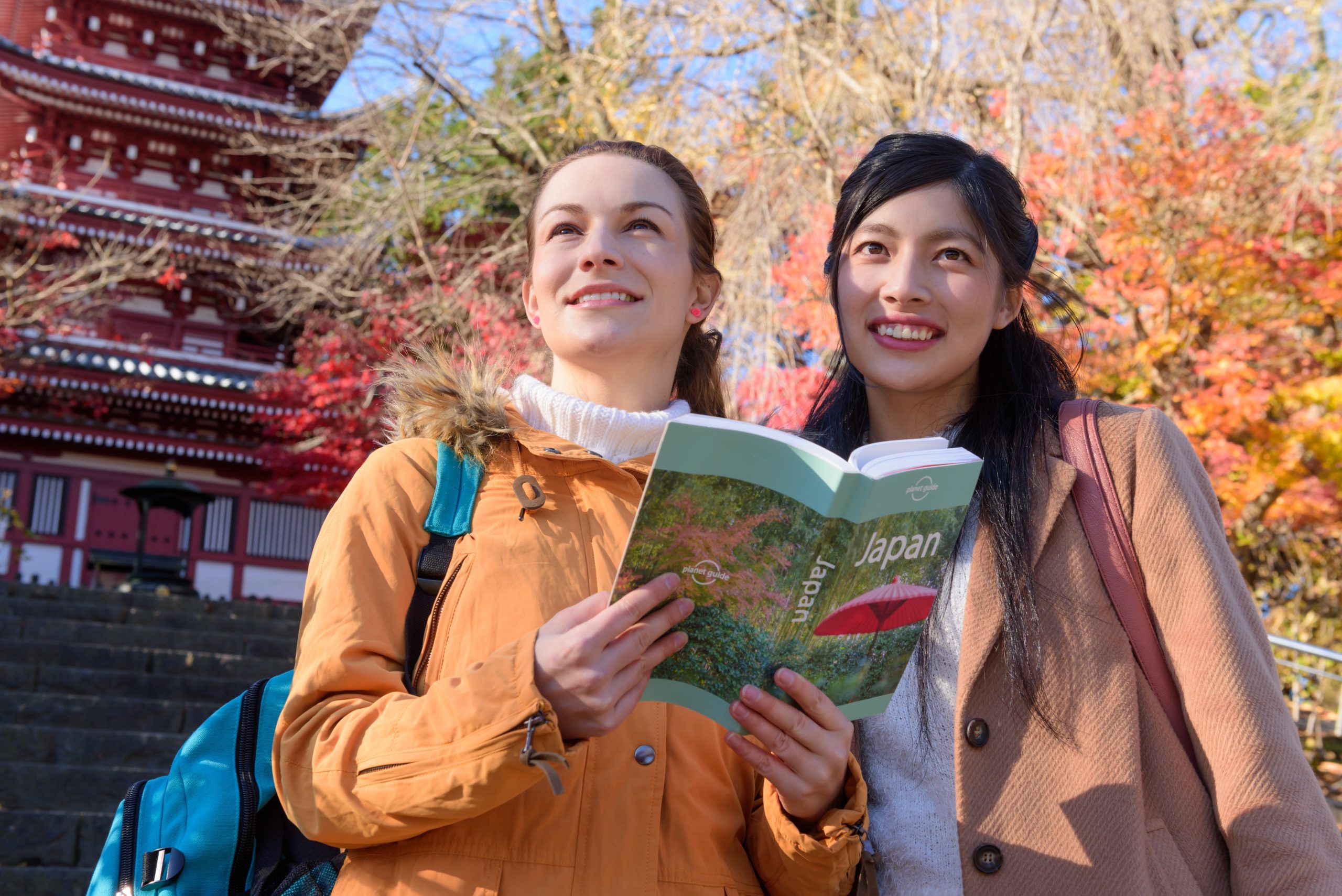
Whether you’re planning a trip to the Land of the Rising Sun or just want to dive into your Japanese studies, it can be daunting to start learning a new language. How about a head start with some basic Japanese phrases that will optimize your travel and daily conversations? In this article, we’ll cover 20 essential Japanese phrases you should know.
It doesn’t matter if you’re just starting out or if you’ve been studying for a while: these Japanese phrases will lay the groundwork for your learning, etiquette, and daily life in Japan. Let’s get started!
Hello, Goodbye – Japanese Greeting Phrases
Greetings are so important in Japan that they have a special word: aisatsu (挨拶、あいさつ). If you’re working in a Japanese office or attending a school in Japan, aisatsu is especially important. Let’s look at the essential aisatsu phrases you’ll need throughout the day.
おはようございます(Ohayougozaimasu)– Good morning
Ohayougozaimasu is Japanese for Good morning! It’s considered essential manners to greet your neighbors, coworkers, or classmates with a bright Ohayougozaimasu! as you enter the workplace or classroom.
Ohayougozaimasu can be said until around 10 or 11 in the morning. There are several ways to say it, depending on how formal the occasion is or what your relationship is with the person to whom you’re speaking.
Examples:
- Polite/Formal – When greeting a stranger, a senior in the work environment, or someone who’s older than yourself: おはようございます!(Ohayougozaimasu!)– Good morning!
- Friendly – When greeting a friend or someone who’s younger than yourself: おはよう!(Ohayou!)– ‘Morning!
- Slang – When greeting friends or family members: おは~!(Ohaa!)– ‘Sup!/Hey!/Hi!
こんにちは(Konnichiwa)– Hello
Konnichiwa is probably the most common aisatsu. It is already quite formal on its own; you can use konnichiwa regardless of the situation or the social status of the person you’re greeting. Technically, konnichiwa is translated as Good afternoon. It’s commonly used between 11 AM and 4 PM. Don’t worry too much about using konnichiwa at the wrong time, though; even Japanese people struggle with when to say it!
Example:
- Hello! How are you? こんにちは!お元気ですか?(Konnichiwa! O genki desu ka?)
To learn some other useful Japanese greetings, take a look at our post Japanese Greetings: How to Say Hello in Japanese.
こんばんは(Konbanwa)– Good evening
Konbanwa is the greeting typically used after the sun has started to go down, or any time after 5 PM. It means good evening, and like konnichiwa can be used freely regardless of social status.
Example:
- Good evening! Are you going home now? こんばんは!今から帰りますか?(Konbanwa! Ima kara kaerimasuka?)
お休みなさい(Oyasuminasai)– Good night
The aisatsu phrase oyasuminasai has more of a “goodbye” nuance than the other Japanese phrases we’ve looked at so far. Parents and family members say it to each other before going to bed, and friends or coworkers might exchange an oyasuminasai before parting ways later in the night.
Oyasuminasai is polite Japanese. You can say oyasumi if you want to sound less formal.
Examples:
- Thank you for the dinner! Good night. ごちそうさまでした!お休みなさい。(Gochisousama deshita! Oyasuminasai.)
- Don’t forget to brush your teeth! ‘Night! 歯磨き忘れないでね!お休み!(Hamigaki wasurenaide ne! Oyasumi!)
行ってきます(Ittekimasu)– I’m leaving
If you’re leaving your home, office, or other familiar setting, it’s considered proper to announce this with ittekimasu! The phrase ittekimasu means, “I’m leaving” or “See you later.” It’s especially important to use this aisatsu if you’re going to do some errands for your office.
There are two ways to say ittekimasu, depending on the situation and who you’re surrounded by. Ittekimasu is the polite form, while ittekuru is more casual.
Examples:
- I’m leaving for the meeting now. 今から会議に行ってきます。(Ima kara kaigi ni ittekimasu.)
- I’m off to school! 学校に行ってくるよ!(Gakkou ni itte kuru yo!)
いってらっしゃい(Itterasshai)– See you later
Japanese people say itterasshai in direct response to ittekimasu. Whereas ittekimasu means, “I’m leaving,” itterasshai means, “See you later.” Both phrases are expected of you when you’re leaving home or another familiar space. Unlike ittekimasu, there’s only one way people say itterasshai. It’s appropriate for any level of formality—just be absolutely sure to say it if someone older than you or higher in social status says, “Ittekimasu!”
Example:
- “Well, I’m off.” “See you later!” 「じゃあ、行ってきます。」「いってらっしゃい!」(”Jaa, ittekimasu.” “Itterasshai!”)
Etiquette: Japanese Polite Phrases
Japan is a country steeped in specific manners for various occasions. There are also some Japanese etiquette phrases that are so specifically Japanese that it’s considered impossible to fully translate them. Phrases like these tend to be staples in Japanese etiquette and tradition, though, so let’s take a brief look at them.
よろしくお願いします。(Yoroshiku onegaishimasu.)– I’m in your care.
The phrase yoroshiku onegaishimasu is essential to Japanese etiquette. Roughly translated, it means I am in your care or please take care of me. Japanese people use it throughout their day: whether they’re meeting someone to the first time or starting a tennis match, yoroshiku onegaishimasu will make an appearance.
Consider this phrase to be “please,” “thank you,” and “I look forward to working with you” all mashed together. These three words best sum up the many nuances yoroshiku onegaishimasu has. For an in-depth study of yoroshiku onegaishimasu, we recommend you check out Bond Lingo’s article or Coto Academy’s list on what it means and how to use it. For now, we’ll just cover some basic situations in which you’ll want to use this phrase.
- When you first meet someone:
Hi, I’m ________. Nice to meet you. はじめまして。___です。よろしくお願いします。(Hajimemashite. _____ desu. Yoroshiku onegaishimasu.) - When you want to thank someone for or entrust them with something:
Mr. Tanaka will not present. Thank you, Mr. Tanaka. これから田中さんが発表させていただきます。田中さん、よろしくお願いします。(Kore kara Tanaka-san ga happyou sasete itadakimasu. Tanaka-san, yoroshiku onegaishimasu.) - When you are about to work/study/perform with someone else:
I’d like to start the match. I look forward to playing with you all. これから試合を始めたいと思います。よろしくお願いします。(Kore kara shiai wo hajimetai to omoimasu. Yoroshiku onegaishimasu.)
If you want to make yourself sound even more formal, you can add the prefix どうぞ(douzo)or say よろしくおねがいいたします(yoroshiku onegaiitashimasu). If you’re speaking with friends and want to say this phrase casually, you can simply say, よろしく(yoroshiku).
お疲れ様です。(Otsukare sama desu.)– Thanks for the hard work.
Like yoroshiku onegaishimasu, the phrase otsukare sama desu has a plethora of nuances and meanings. Another staple in the Japanese workplace, otsukare sama is often used to thank someone for the work they’ve done. It’s often used at the end of the day when workers begin to clock out. However, ostukare sama desu is also used at the end of events, appointments, or other social occasions as a way to wrap things up and thank everyone for participating. Here are some common situations in which the phrase can be used:
- When you’re leaving for the day:
“I’m done for the day. Good work, everyone!” お先に失礼します。お疲れ様でした!(O saki ni shitsurei shimasu. Otsukare sama deshita!) - When meeting up for a dinner or party after work:
“Good work today. What’s for dinner?” “お疲れ様です。今日のご飯は何でしょう?” (Otsukare sama desu. Kyou no gohan wa nan deshou?) - As a general workplace greeting in the morning, afternoon, or evening:
“Hey there, Mr. Tanaka. How are you?” “田中さん、お疲れ様です。お元気ですか?” (Tanaka-san, otsukare sama desu. O genki desu ka?)
すみません
The word sumimasen is most often used to say excuse me or sorry. However, it can also be used to thank someone! Sumimasen is a useful phrase to remember and is guaranteed to make you sound polite.
Examples:
- “Excuse me, could I borrow your phone?” “すみません、スマホを借りていいですか?” (Sumimasen, sumaho wo karite ii desu ka?)
- “I’ll buy you a drink.” “Thank you.” “飲み物買ってあげるよ。” “すみません。” (“Nomimono wo katte ageruyo.” “Sumimasen.”)
Of course, sumimasen is not the only way to apologize in Japanese. If you’d like to learn the other ways to say “sorry” in Japanese, check out our blog post Sorry in Japanese: Learn How to Properly Apologize in Japanese.

Dining: Japanese Food-related Phrases
If you visit Japan, you’ll want to experience the many delicious foods it has to offer! Here are some Japanese phrases that will help you navigate your eating experience in Japan.
__をください。(_____ wo kudasai.)– I’d like _______, please.
Japanese menus are often colorful and packed with helpful photos. Even if you can’t read kanji or hiragana, you should be able to point to what looks the tastiest and use this phrase! For example:
- “I’d like this, please.” “これをください。” (Kore wo kudasai.)
If you want more than one thing, say kore as many times as you like! Just add the particle と(to, pronounced “toh”)between them.
“I’d like this and this, please.” “これとこれをください。” (Kore to kore wo kudasai.)
__アレルギーがあります。(____ arerugii ga arimasu.)– I have a(n)____ allergy.
Allergies can be tricky when navigating foreign food. Fortunately, the Japanese word for “allergy” is borrowed from English: アレルギー(arerugii)! Here are some common examples for explaining you have a food allergy:
- “I have a peanut allergy.” “ピーナツアレルギーがあります。”(“Piinatsu arerugii ga arimasu.”)
- “I’m lactose intolerant.” “牛乳アレルギーがあります。” (“Gyuunyuu arerugii ga arimasu.”)
- “I’m allergic to tree nuts.” “ナッツアレルギーがあります。” (Nattsu arerugii ga arimasu.”)
いただきます!・ごちそうさまでした!(Itadakimasu!/Gochisou sama deshita!)– Let’s eat!/ Thank you for the food!
Before and after you eat in Japan, it’s essential that you say these phrases. Itadakimasu means literally I humbly receive and gochisou sama means it was a feast. Both are rooted in Japanese Buddhism and express thanks to the person who prepared the meal. It’s considered rude not to use these phrases when you’re eating with others, so try to remember them!
Wrapping Up: Japanese Survival Phrases
Of course you’re excited to visit Japan, but if something goes wrong you’ll need some Japanese knowledge to figure out what to do or where to go. Here’s a quick list of Japanese phrases to help you in a pinch.
お手洗い・トイレはどこですか?(O tearai/toire wa doko desu ka?)– Where is the restroom?
This phrase is pretty self-explanatory, but just as vital! There are two common words for bathroom in Japanese: o tearai and the borrowed word toire. Either one will convey your meaning, and you can rest assured that whoever you ask will either point or guide you to the nearest facilities.
You can also use ___wa doko desuka? to ask about the location of any facility or place! Don’t be afraid to use this phrase; it’s a huge help.
あなたの名前は何ですか?(Anata no namae wa nan desu ka?)– What’s your name?
When asking a stranger’s name in Japanese, it’s polite to refer to them as あなた(anata)or the polite word for you. However, if you’re talking to a child or someone you want to be friendly with right away, you can replace anata with きみ(kimi). In Japanese, you can sometimes leave out pronouns altogether, so simply asking お名前は何ですか?(O namae wa nan desu ka?)is also acceptable.
If someone asks for your name, the response should be, 私の名前は__です。(Watashi no namae wa ____ desu.)
Examples:
- Polite: “What is your name?” “My name is Tanaka.” 「あなたの名前は何ですか?」「私の名前は田中です。」(“Anata no namae wa nan desu ka?” “Watashi no namae wa Tanaka desu.”)
- Casual: “What’s your name?” “Ken Tanaka.” 「名前は何ですか?」「田中健です。」(“Namae wa nan desu ka?” “Tanaka Ken desu.”)
It’s important to note that in Japan, people often call each other by their last names. Because of this, when someone introduces themselves, they will either use their last name only, or say their last name followed by their first name. Remember to stick with calling a new acquaintance by their last name! First-name basis is only for friends and family members in Japan.
手伝ってくれませんか?(Tetsudatte kuremasen ka?)– Could you please help me?
The phrase Tetsudatte kuremasen ka? will cover pretty much any situation you might need some personal help with. This phrase is polite Japanese; you can be a little less formal (but still polite) by saying, 手伝ってください。(Tetsudatte kudasai.)
If you are experiencing an emergency, the phrase 助けてください!(Tasukete kudasai!)will best convey your urgency. However, as this is typically an emergent phrase, please don’t use it unless your need is dire.
Essential Japanese Phrases – Conclusion
We hope you find these Japanese phrases useful! An important thing to remember is that whether or not you feel confident in your language ability, Japanese people are always delighted when people speak to them in their own language. Communication is key, and it doesn’t have to be perfect.
If you liked this list, check out I Will Teach You a Language‘s extensive list for even more Japanese words and phrases! Good luck with your travel and with your studies!
Thank you for reading this article; if you’ve ever used any of these Japanese phrases or if you have a question, feel free to leave a comment!
Clozemaster has been designed to help you learn the language in context by filling in the gaps in authentic sentences. With features such as Grammar Challenges, Cloze-Listening, and Cloze-Reading, the app will let you emphasize all the competencies necessary to become fluent in Japanese.
Take your Japanese to the next level. Click here to start practicing with real Japanese sentences!


